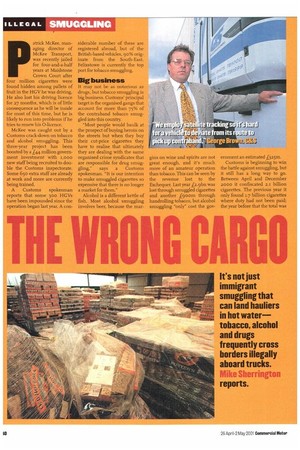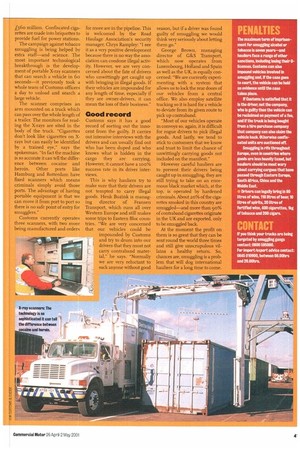THEIVRONO eitt1100
Page 42

Page 43

If you've noticed an error in this article please click here to report it so we can fix it.
atrick McKee, managing director of McKee Transport, was recently jailed for four-and-a-half years at Maidstone Crown Court after ur million cigarettes were found hidden among pallets of fruit in the HGV he was driving. He also lost his driving licence for 27 months, which is of little consequence as he will be inside for most of this time, but he is likely to run into problems if he tries to renew his 0-licence.
McKee was caught out by a Customs crack-down on tobacco and alcohol smuggling. This three-year project has been boosted by a Z44 million government investment with L000 new staff being recruited to double the Customs inspectorate. Some 650 extra staff are already at work and more are currently being trained.
A Customs spokesman reports that some 3oo HGVs have been impounded since the operation began last year. A con siderable number of these are registered abroad, but of the British-based vehicles, 90% originate from the South-East. Felixstowe is currently the top port for tobacco smuggling.
Big business
It may not be as notorious as drugs, but tobacco smuggling is big business. Customs' principal target is the organised gangs that account for more than 75% of the contraband tobacco smuggled into this country.
"Most people would baulk at the prospect of buying heroin on the streets but when they buy their cut-price cigarettes they have to realise that ultimately they are dealing with the same organised crime syndicates that are responsible for drug smuggling," says a Customs spokesman. "It is our intention to make smuggled cigarettes so expensive that there is no longer a market for them."
Alcohol is a different kettle of fish. Most alcohol smuggling involves beer, because the mar gins on wine and spirits are not great enough, and it's much more of an amateur operation than tobacco. This can be seen by the revenue lost to the Exchequer. Last year /2.9bn was lost through smuggled cigarettes and another 19 oom through hancirolling tobacco, but alcohol smuggling "onlycost the gov
ernment an estimated L325m.
Customs is beginning to win the battle against smuggling, but it still has a long way to go. Between April and December 2000 it confiscated 2.1 billion cigarettes. The previous year it only found 1.7 billion cigarettes where duty had not been paid; the year before that the total was
f56o million. Confiscated cigarettes are made into briquettes to provide fuel for power stations.
The campaign against tobacco smuggling is being helped by extra staff—and science. The most important technological breakthrough is the development of portable X-ray scanners that can search a vehicle in Go seconds—it previously took a whole team of Customs officers a day to unload and search a large vehicle.
The scanner comprises an arm mounted on a truck which can pass over the whole length of a trailer. The monitors for reading the X-rays are sited in the body of the truck. "Cigarettes don't look like cigarettes on Xrays but can easily be identified by a trained eye," says the spokesman. "In fact the machine is so accurate it can tell the difference between cocaine and heroin. Other ports like Hamburg and Rotterdam have fixed scanners which means criminals simply avoid those ports. The advantage of having portable equipment is that we can move it from port to port so there is no safe point of entry for smugglers."
Customs currently operates three scanners, with two more being manufactured and orders for more are in the pipeline. This is welcomed by the Road Haulage Association's security manager, Chrys Rampley: "I see it as a very positive development because there is no way the association can condone illegal activity. However, we are very concerned about the fate of drivers who unwittingly get caught up with bringing in illegal goods. If their vehicles are impounded for any length of time, especially if they are owner-drivers, it can mean the loss of their business."
Good record
Customs says it has a good record of sorting out the innocent from the guilty. It carries out intensive interviews with the drivers and can usually find out who has been duped and who knows what is hidden in the cargo they are carrying. However, it cannot have a r00% success rate in its driver interviews.
This is why hauliers try to make sure that their drivers are not tempted to carry illegal goods. Henk Buzinlc is managing director of Fransen Transport, which runs all over Western Europe and still makes some trips to Eastern Bloc countries. "We are very concerned that our vehicles could be impounded by Customs and try to drum into our drivers that they must not carry contraband material," he says. "Normally we are very reluctant to sack anyone without good
reason, but if a driver was found guilty of smuggling we would think very seriously about letting them go."
George Brown, managing director of G&S Transport, which now operates from Luxembourg, Holland and Spain as well as the UK, is equally concerned: We are currently experimenting with a system that allows us to lock the rear doors of our vehicles from a central office. We also employ satellite tracking so it is hard for a vehicle to deviate from its given route pick up contraband.
"Most of our vehicles operate in convoys so, again, it is difficult for rogue drivers to pick illegal goods. And lastly, we tend to stick to customers that we know and trust to limit the chance of unwittingly carrying goods riot included on the manifest."
However careful hauliers are to prevent their drivers being caught up in smuggling, they are still trying to take on an enormous black market which, at the top, is operated by hardened criminals. About zo% of the cigarettes smoked in this country are smuggled—and more than 90% of contraband cigarettes originate in the UK and are exported, only to be smuggled back.
At the moment the profit on them is so great that they can be sent round the world three times and still give unscrupulous villains a healthy return. So, chances are, smuggling is a problem that will dog international hauliers for a long time to come.
































































































